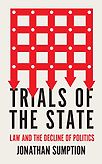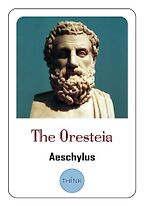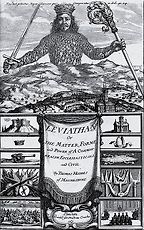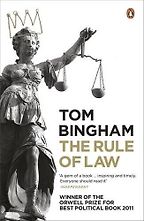The books on the rule of law you’ve chosen to talk about today deal a lot with legal theory. Do you need to be a good philosopher and historian to be a good lawyer? Or is that just an incidental achievement?
No, you don’t. The rule of law is rather an abstract subject. It invites questions about what the rule of law means and what the purpose of law is. These are not questions that practitioners tend to ask. They arise prior to the grubby stage where you actually have problems that you need to solve.
Let’s explore those questions as we look at the books. First up we have Aeschylus’ Oresteia. This is a trilogy of plays—what do they tell us about the rule of law?
The Oresteia is an immense political and legal allegory. It’s about the replacement of a world in which justice meant vengeance by a world in which you have a serious investigation of the facts and an examination of the relevant law. It’s about the creation of courts as an alternative to anarchy and despotism.
The critical part of it is in the third play of the trilogy, The Eumenides. The first two plays are essentially a reprise of the Homeric legend. You have a succession of murders. Agamemnon, king of Argos, sacrifices his daughter, Iphigenia, to persuade the gods to send him a favourable wind to conquer Troy. He returns 10 years later and his wife, Clytemnestra, kills him to avenge the killing of their daughter. Their son Orestes is then commanded by Apollo to avenge his father’s murder by killing Clytemnestra, which he does. So this is a world in which justice is vengeance. In Greek mythology, avenging injustice was the job of the Furies. They were creatures of hideous aspect who hunted sinners from their communities.
“I think that Mill would have deplored the pressures created by social media to conform to particular ideas.”
The Eumenides is about the trial of Orestes for the murder of his mother. Athena, the goddess of wisdom, puts an end to the cycle of lawlessness and violence and anarchy by founding a court to decide whether Orestes has a defence.
Orestes raises two defences. His first defence is that Clytemnestra had it coming to her because she murdered Agamemnon. His second defence is that Apollo told him to do it—superior orders. The outcome is that Orestes is acquitted by Athena’s casting vote. Now, that’s a very crude and short summary of a play which is really a very profound analysis of the process by which law comes to restrain the violent instincts of men and replaces capricious violence and despotism with something more ordered and predictable. The great phrase of Athena in the translation that I use is “let no man live uncurbed by law or curbed by tyranny”, which is a very exact description of the function of law. It is something that constrains the activities of men and spares them the tyranny of arbitrary violence.
It’s not just an allegory of law—the Oresteia is also one of the greatest achievements of human civilization. It’s profound, it’s intense, it’s dramatic and, above all, the language is exceptionally beautiful. There is a problem about translations. In many translations, you won’t get the beauty of the language. Greek is a very allusive language. It’s rich in subtle synonyms and metaphors, and therefore hard to convey in the kind of down-to-earth language that is now fashionable for translators. Most people I suspect read the Oresteia in the Penguin Classics versions or the Oxford Classics translation. I have to say I find them rather flat.
Get the weekly Five Books newsletter
I much prefer the old-fashioned Victorian translations. The best of them is by Edmund Morshead. He was an eccentric Victorian schoolmaster who wrote a verse translation. Verse translations inevitably mean you have to take some liberties or resort to paraphrase. It’s not literal. It’s dramatic and rhetorical. It’s high-flown. But it conveys the ideas better than an exact translation would do.
It is still available?
Yes, it’s available on Amazon.
Let’s move on to Leviathan by Thomas Hobbes. Hobbes was also concerned with the curtailing of violent human instincts.
He was concerned with exactly the same problem, yes.
Although in my recollection of studying him at university, he didn’t think that the law was there to curb tyranny. He thought the monarch must be absolute. Is that right?
He certainly believed that law was there to curb the tyranny of violence, but he believed that the only way to curb the tyranny of violence was to have an absolute ruler—it didn’t have to be a monarch, but obviously Hobbes thought in those terms, because in the seventeenth century most societies were monarchies. Hobbes was saying that law is the instrument of government, and government’s purpose is to defend us against anarchy. He was an apologist for absolute government. He believed the law was a creation of human societies, and not some kind of eternal moral truth. Societies were composed of people who had surrendered their liberty to an absolute ruler in return for security and protection from arbitrary violence. So the law was whatever the sovereign commanded in order to achieve that.
The best reason for reading Hobbes is that no other philosopher has ever used the English language to such powerful effect. It is a really remarkable feat of dialectic. You find yourself agreeing with him at each stage of the reasoning as he builds up his case then, quite suddenly, you find that you’ve arrived at a conclusion which seems intolerable. You say to yourself, “Goodness, how did I end up here?” I read Hobbes as a first year student at Oxford. I had never read him before, although I had vaguely heard of him. I rejected his conclusion root and branch, but I was completely bowled over by the power of his deductive reasoning and the seductive force his language.
What are the intolerable conclusions that he draws?
The intolerable conclusion is that there is no alternative to absolute government, that you have to have total surrender to government because nothing short of that can be guaranteed to produce civil peace. He actually recognized only one limitation on the power of government, which is that the sovereign was not entitled to do something which would require his subjects to end their own lives, because the whole purpose of the sovereign’s powers was to avoid that result.
People don’t concentrate much on the end of his Leviathan which I think covers the Christian commonwealth. But even there, are there any sort of limitations put on a Christian monarch?
Hobbes needed God to provide a moral rule. We now have the problem of devising moral rules without external authorities like God, but that was a refinement that Hobbes did not have to grapple with.
Your next book choice illuminating the rule of law is John Stuart Mill’s On Liberty. Mill was very much opposed to Hobbes’ absolutist position, I think.
They start from opposite ends of the spectrum. Hobbes regarded absolute government as necessary for human contentment, and thought it required no other justification. John Stuart Mill regarded human contentment as depending on an altogether wider range of factors than mere security. He starts from the proposition that every exercise of coercive power has got to be justified because all constraints of liberty inhibit the development of human talent. On Liberty is the classic statement of traditional liberal values about the limits of state coercion. It’s an eloquent argument for personal liberty on the grounds that it’s the condition in which human beings are most likely to flourish and be happy.
“Tom Bingham’s book is a wise book . . . It is the fruit of a good deal of experience.”
The question which he is trying to answer is, “what restrictions on personal liberty is it legitimate to impose by law?” He famously believed that people should only be prevented by law from doing things that harm others. So you should not prevent people from harming themselves and you should not prevent them from doing something simply because other people disagree or disapprove. The law exists to protect us from harm. It doesn’t exist to recruit us to moral conformity. Mill was very concerned about pressures to conformity, which he believed were an inherent problem in democracies, such as Victorian Britain was becoming when he wrote. Some of his concerns are extremely pertinent to today’s world.
I got a sense from reading it that he’s often thinking about the pressures of religious conformity when he’s thinking about the individual’s own good not being a sufficient warrant for coercion. Is that true?
Well, he certainly objected to the idea that the law should save us from sin. Of course, in his day, the main pressures to enforce standards of behaviour, regardless of their impact on others, came from religious groups. But that is not always true, nor did Mill imagine that it would be.
Five Books interviews are expensive to produce. If you're enjoying this interview, please support us by donating a small amount.
The criteria which I sought to apply in choosing my five books is that each one has to be thought-provoking and it has to have high literary quality. And Mill does write beautifully. His style couldn’t be more different from that of Hobbes, but it’s elegant and it’s reasoned, like everything that Mill wrote. His autobiography is a masterpiece.
What is particularly pertinent about On Liberty today?
We live in an age that expects conformity and believes that moral judgments should be made collectively and enforced on those who don’t agree. I think that Mill would have deplored the pressures created by social media to conform to particular ideas. He would have deplored all of the laws which require us to act in particular ways even though there is no harm to others, for example the rules about fur farming. Much modern law gives coercive effect to moral principles about which we don’t all agree and whose observance by an individual makes no difference to anyone else. It just gives true believers the satisfaction of knowing that they’ve imposed their values on someone else. This was the essence of what Mill objected to.
Let’s move on to Ronald Dworkin’s Justice for Hedgehogs. I really didn’t know anything about him at all. But as I understand it, Hobbes has this idea of positivist law, that law is a creation of society rather than external to it. But Ronald Dworkin rejects that. Is that right?
He totally rejects it. He’s at the opposite extreme. They are similar in the skill with which they deploy language and the tightness of their techniques of argument. But I think that this book, which was Dworkins’ last, actually published in 2011, not long before his death in 2013, is a modern classic. The fact that I completely disagree with its central thesis does not stop me from saying so.
“The Eumenides is about the trial of Orestes for the murder of his mother. Athena, the goddess of wisdom, puts an end to the cycle of lawlessness and violence and anarchy by founding a court to decide whether Orestes has a defence.”
Dworkin was an American legal philosopher, although much of his career was passed in British universities, particularly London and Oxford. He was famous for pungent, opinionated and elegant essays contributing to public debates about rights.
But you’re right that he rejected the view of the legal positivists that rights were the creation of human societies. He believed that there were basic rights, including what we would call human rights, which existed in the abstract. He asked himself, “can you have a moral principle, which is true regardless of whether anyone believes in it. Can you have a moral principle which nobody is aware of and nobody believes and yet is a true moral principle?” I find that conceptually extraordinarily difficult because moral principles are essentially the creation of the human intellect. They are responses to perceived social needs. The idea that they can exist apart from society strikes me as bizarre, but Dworkin’s book is very skilful in the way in which he builds the argument up. I think that he is one of the great modern legal thinkers.
What is the hedgehog of the title exactly?
The book is not about animal rights! The title is derived from an aphorism attributed to the archaic Greek poet, Archilochus, that the fox knows many things but the hedgehog knows one big thing. So what he’s talking about is the difference between thinkers who bring insights into a single great idea (hedgehogs) and thinkers who just skate over the whole surface of human knowledge (foxes).
“Hobbes was saying that law is the instrument of government and government’s purpose is to defend us against anarchy. He was an apologist for absolute government.”
Dworkin characterized himself as a hedgehog, because he basically thought that all thinking on the subject of law and rights was interconnected, so it was basically one great big subject. When you read his book you find that it wanders disparately over a large number of different fields to make his point. My own view is that Dworkin was not really the hedgehog he claimed to be. He was actually a fox in hedgehog’s clothing.
If moral values are external to human society or independent of it in some way, there must be some independent criteria of judgment, which could be God, but what’s Dworkin’s criteria?
He doesn’t have one. That’s the great weakness of his argument. You need a source of legitimacy. If the legitimacy of a moral rule is not conferred by collective social choice, what is it that makes it legitimate? As you point out, in a religious age the answer would have been straightforward, that moral laws came from God. The same could be said with totalitarian dictatorships. Moral principles come from the ideology of their ruling groups. But if you’ve got a democracy, as Dworkin is assuming, it becomes extremely difficult to identify a source of legitimacy other than the choice, directly or indirectly made, of the people.
But your view is that he fundamentally fails to do that.
I am a legal positivist. I wouldn’t describe myself as a legal philosopher, but most legal philosophers these days are positivists. And I think that they’re right. The great positivist who disagreed constantly with Dworkin was Dworkin’s teacher, Herbert Hart, whose book, The Concept of Law, is probably the finest modern statement of the positivist position.
Let’s move on to Tom Bingham’s The Rule of Law.
This is a short book, published in 2010, shortly before the author’s death. It certainly isn’t a philosophical work on a par with Dworkin’s. And Tom Bingham would never have suggested that it was. It doesn’t seek to grapple with the profound philosophical problems about the moral basis of legal coercion. It’s essentially a basic introduction to the social and political functions of law in modern Britain, which is addressed to non-lawyers. My main reason for including it is to pay tribute to the memory of one of the great judges of our time, somebody who combined legal learning with a profound understanding of the workings of society and very great personal wisdom. He was a truly remarkable man.
Again, The Rule of Law is a book with which, in one very critical respect, I profoundly disagree, because Tom Bingham believed that the rule of law required the recognition of a broad range of legal rights, more or less corresponding to the Human Rights Convention. I find that very difficult. Privacy, freedom of speech, freedom of assembly; obviously these things are desirable and a civilized society should want them, but a society can be governed by the rule of law irrespective of the contents of the law, with only one exception. The exception is that you clearly do have to have a right not to be arbitrarily imprisoned or assaulted without legal authority, or you’re not really a society at all. But, apart from that, I think that there are serious problems about saying the rule of law requires the law to have a certain content.
What drove Tom Bingham to insist on that?
That’s not entirely clear. Basically what he says is that a decent society ought to want these things and I would entirely agree with that. A decent society ought to want them. But you want them because they are in themselves desirable and not because they’re eternal truths implicit in the rule of law. Was there really no rule of law in England before the rights that Tom Bingham is talking about were created? In some instances that wasn’t until the Human Rights Act was passed in 1998.
“If you’ve got a democracy, as Dworkin is assuming, it becomes extremely difficult to identify a source of legitimacy other than the choice, directly or indirectly made, of the people.”
I would say that Victorian Britain was characterized by the rule of law, notwithstanding that many of the rights that Tom Bingham is talking about did not then exist.
Is he is trying to grapple with the same problem that Ronald Dworkin was trying to grapple with or is it slightly different?
No. I think it is different. Ronald Dworkin is trying to justify the proposition that moral principles are prior to law and can constrain the laws which is legitimate for societies to make. Tom Bingham’s is a much more practical and down-to-earth book. It is basically describing how law works in modern Britain. He is undoubtedly right to say that human rights are an important part of it, but where I find it difficult to agree with him is when he says that this is inherent in the rule of law. It isn’t; you can have the rule of law even if the laws are repellent. There are societies that are undoubtedly characterized by the rule of law. They ban arbitrary interference with people’s liberty and or lives, but they do not have the full range of basic rights that we have.
Tom Bingham’s book is a wise book that has many other things beyond those that we’ve just been discussing: for example his views about international law; or the sovereignty of Parliament. It is the fruit of a good deal of experience.
Five Books aims to keep its book recommendations and interviews up to date. If you are the interviewee and would like to update your choice of books (or even just what you say about them) please email us at [email protected]












